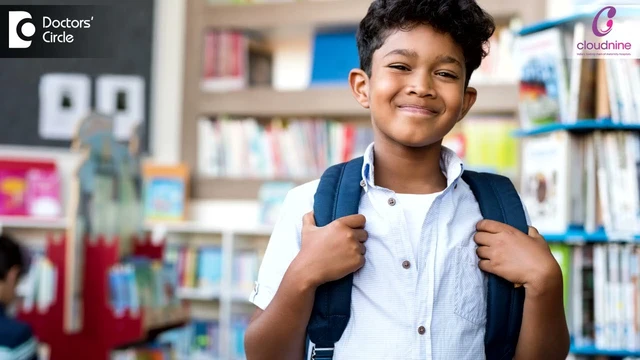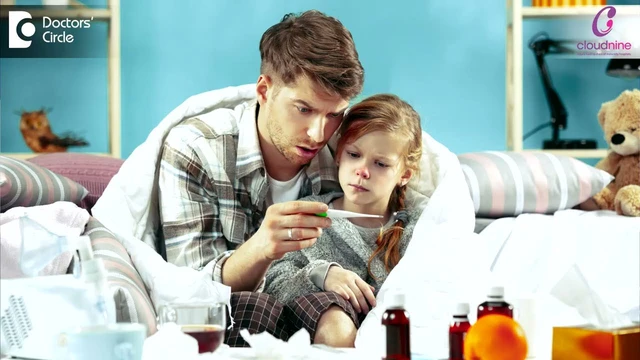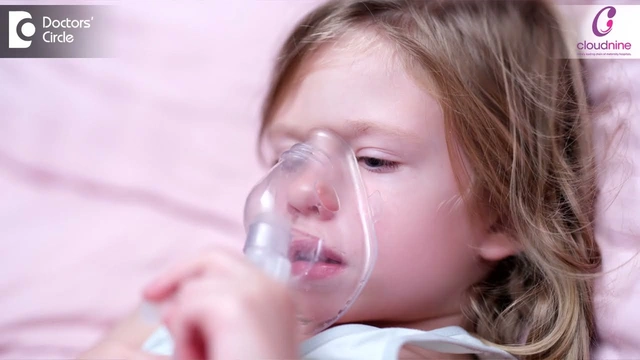

Dr. Sanjeev S Managoli is a Senior Consultant Pediatrician with a vast experience of 25+ years in the field of Pediatrics.
Earlier, he was a Teaching Faculty in Mahatma Gandhi Institute of Medical Sciences, Maharashtra, and Professor in MVJ Medical College, and Bowring & Lady Curzon Medical College, Bengaluru, Karnataka.
He did his under-graduation from SNMC Govt Med College, Rajasthan and Post-graduation (MD) from Regional Institute of Mother & Child Health, Govt Med College, Jodhpur, Rajasthan. His areas of interest include General Pediatrics, Lactation Management, Infant & Young Child Feeding, Pulmunology, and Vaccinology.
KMC- 92542

Dr. Sanjeev Shrinivas Managoli practices at Electronic City, Bengaluru.

You can book a consultation with Dr. Sanjeev Shrinivas Managoli via 'Cloudnine' app, through the Cloudnine website, a phone call on the customer care no, directly from the hospital.

Patients frequently visit Dr. Sanjeev Shrinivas Managoli for Pediatrics & child health issues related consultations and treatments.

Anytime via 'Cloudnine' app or Cloudnine’s website.

Dr. Sanjeev Shrinivas Managoli has the following qualifications: M.B.B.S, M.D (Pediatrics)

Dr. Sanjeev Shrinivas Managoli is a Pediatrician.
Dr. Sanjeev Shrinivas Managoli is the Best Paediatrician in Electronic City, Bengaluru. Book Appointment Online, View doctor fees, read user reviews and real patient feedbacks, Contact Number - 099728 99728. Dr. Sanjeev Shrinivas Managoli is a Senior Consultant at Cloudnine Hospitals - Consult the Best Pediatrician near you.


Dr. Sanjeev S Managoli is a Senior Consultant Pediatrician with a vast experience of 25+ years in the field of Pediatrics.
Earlier, he was a Teaching Faculty in Mahatma Gandhi Institute of Medical Sciences, Maharashtra, and Professor in MVJ Medical College, and Bowring & Lady Curzon Medical College, Bengaluru, Karnataka.
He did his under-graduation from SNMC Govt Med College, Rajasthan and Post-graduation (MD) from Regional Institute of Mother & Child Health, Govt Med College, Jodhpur, Rajasthan. His areas of interest include General Pediatrics, Lactation Management, Infant & Young Child Feeding, Pulmunology, and Vaccinology.
KMC- 92542
d87wudtgAi
Dr. Sanjeev Shrinivas Managoli practices at Electronic City, Bengaluru.
You can book a consultation with Dr. Sanjeev Shrinivas Managoli via 'Cloudnine' app, through the Cloudnine website, a phone call on the customer care no, directly from the hospital.
Patients frequently visit Dr. Sanjeev Shrinivas Managoli for Pediatrics & child health issues related consultations and treatments.
Anytime via 'Cloudnine' app or Cloudnine’s website.
Dr. Sanjeev Shrinivas Managoli has the following qualifications: M.B.B.S, M.D (Pediatrics)
Dr. Sanjeev Shrinivas Managoli is a Pediatrician.
Dr. Sanjeev Shrinivas Managoli is the Best Paediatrician in Electronic City, Bengaluru. Book Appointment Online, View doctor fees, read user reviews and real patient feedbacks, Contact Number - 099728 99728. Dr. Sanjeev Shrinivas Managoli is a Senior Consultant at Cloudnine Hospitals - Consult the Best Pediatrician near you.

Best Maternity hospital in India.


 Best Gynecologists in Bellandur
Best Gynecologists in Bellandur  Best Gynecologists in Electronic City
Best Gynecologists in Electronic City  Best Gynecologists in HRBR Layout
Best Gynecologists in HRBR Layout Best Gynecologists in Jayanagar
Best Gynecologists in Jayanagar  Best Gynecologists in Kanakapura Road
Best Gynecologists in Kanakapura Road Best Gynecologists in Malleswaram
Best Gynecologists in Malleswaram  Best Gynecologists in Nagarbhavi
Best Gynecologists in Nagarbhavi  Best Gynecologists in Old Airport Road
Best Gynecologists in Old Airport Road Best Gynecologists in Sahakarnagar
Best Gynecologists in Sahakarnagar  Best Gynecologists in Sarjapur Road
Best Gynecologists in Sarjapur Road Best Gynecologists in Thanisandra
Best Gynecologists in Thanisandra Best Gynecologists in Varthur Road
Best Gynecologists in Varthur Road Best Gynecologists in Whitefield
Best Gynecologists in Whitefield  Best Gynecologists in Industrial Area Phase II
Best Gynecologists in Industrial Area Phase II Best Gynecologists in OMR
Best Gynecologists in OMR Best Gynecologists in T Nagar
Best Gynecologists in T Nagar Best Gynecologists in New Industrial Town
Best Gynecologists in New Industrial Town Best Gynecologists in Indirapuram
Best Gynecologists in Indirapuram Best Gynecologists in Golf Course Road
Best Gynecologists in Golf Course Road Best Gynecologists in Sector 14
Best Gynecologists in Sector 14 Best Gynecologists in Sector 47
Best Gynecologists in Sector 47 Best Gynecologists in Banjara Hills
Best Gynecologists in Banjara Hills Best Gynecologists in Gachibowli
Best Gynecologists in Gachibowli Best Gynecologists in Hitech City
Best Gynecologists in Hitech City Best Gynecologists in Kompally
Best Gynecologists in Kompally Best Gynecologists in Gomti Nagar
Best Gynecologists in Gomti Nagar Best Gynecologists in Malad
Best Gynecologists in Malad Best Gynecologists in Nerul
Best Gynecologists in Nerul Best Gynecologists in Vashi
Best Gynecologists in Vashi Best Gynecologists in Kailash Colony
Best Gynecologists in Kailash Colony Best Gynecologists in Patparganj
Best Gynecologists in Patparganj Best Gynecologists in Punjabi Bagh
Best Gynecologists in Punjabi Bagh Best Gynecologists in Vikaspuri
Best Gynecologists in Vikaspuri Best Gynecologists in Gaur City
Best Gynecologists in Gaur City Best Gynecologists in Pari Chowk
Best Gynecologists in Pari Chowk Best Gynecologists in Sector 51
Best Gynecologists in Sector 51 Best Gynecologists in Sector 5 Swastik Vihar
Best Gynecologists in Sector 5 Swastik Vihar Best Gynecologists in Kalyani Nagar
Best Gynecologists in Kalyani Nagar Best Gynecologists in SB Road
Best Gynecologists in SB Road Best Gynecologists in Pimple Saudagar
Best Gynecologists in Pimple Saudagar Best Pediatricians in Bellandur
Best Pediatricians in Bellandur Best Pediatricians in Electronic City
Best Pediatricians in Electronic City Best Pediatricians in HRBR Layout
Best Pediatricians in HRBR Layout Best Pediatricians in Jayanagar
Best Pediatricians in Jayanagar Best Pediatricians in Kanakapura Road
Best Pediatricians in Kanakapura Road Best Pediatricians in Malleswaram
Best Pediatricians in Malleswaram Best Pediatricians in Nagarbhavi
Best Pediatricians in Nagarbhavi Best Pediatricians in Old Airport Road
Best Pediatricians in Old Airport Road Best Pediatricians in Sahakarnagar
Best Pediatricians in Sahakarnagar Best Pediatricians in Sarjapur Road
Best Pediatricians in Sarjapur Road Best Pediatricians in Thanisandra
Best Pediatricians in Thanisandra Best Pediatricians in Varthur Road
Best Pediatricians in Varthur Road Best Pediatricians in Whitefield
Best Pediatricians in Whitefield Best Pediatricians in Industrial Area Phase II
Best Pediatricians in Industrial Area Phase II Best Pediatricians in OMR
Best Pediatricians in OMR Best Pediatricians in T Nagar
Best Pediatricians in T Nagar Best Pediatricians in New Industrial Township
Best Pediatricians in New Industrial Township Best Pediatricians in Indirapuram
Best Pediatricians in Indirapuram Best Pediatricians in Golf Course Road
Best Pediatricians in Golf Course Road Best Pediatricians in Sector 14
Best Pediatricians in Sector 14 Best Pediatricians in Sector 47
Best Pediatricians in Sector 47 Best Pediatricians in Hitech City
Best Pediatricians in Hitech City Best Pediatricians in Banjara Hills
Best Pediatricians in Banjara Hills Best Pediatricians in Gachibowli
Best Pediatricians in Gachibowli Best Pediatricians in Kompally
Best Pediatricians in Kompally Best Pediatricians in Gomti Nagar
Best Pediatricians in Gomti Nagar Best Pediatricians in Malad
Best Pediatricians in Malad Best Pediatricians in Nerul
Best Pediatricians in Nerul Best Pediatricians in Vashi
Best Pediatricians in Vashi Best Pediatricians in Kailash Colony
Best Pediatricians in Kailash Colony Best Pediatricians in Patparganj
Best Pediatricians in Patparganj Best Pediatricians in Punjabi Bagh
Best Pediatricians in Punjabi Bagh Best Pediatricians in Vikaspuri
Best Pediatricians in Vikaspuri Best Pediatricians in Gaur City
Best Pediatricians in Gaur City Best Pediatricians in Pari Chowk
Best Pediatricians in Pari Chowk Best Pediatricians in Sector 51
Best Pediatricians in Sector 51 Best Pediatricians in Sector 5 Swastik Vihar
Best Pediatricians in Sector 5 Swastik Vihar Best Pediatricians in Kalyani Nagar
Best Pediatricians in Kalyani Nagar Best Pediatricians in SB Road
Best Pediatricians in SB Road Best Pediatricians in Pimple Saudagar
Best Pediatricians in Pimple Saudagar



.webp)

